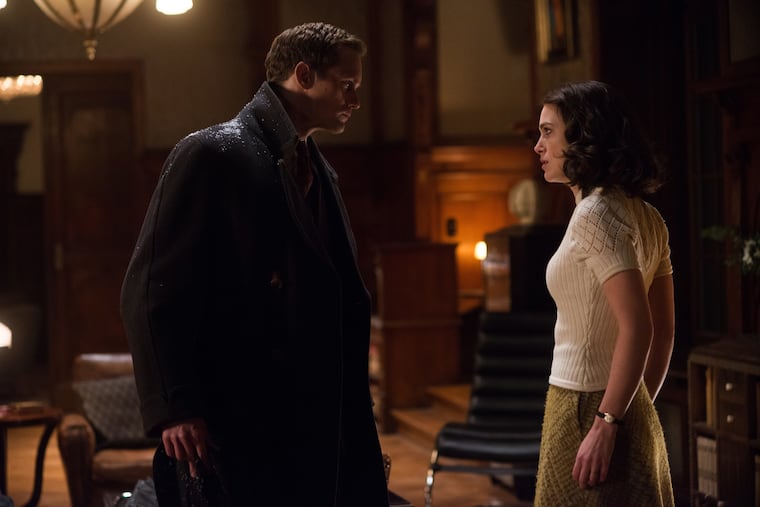‘The Aftermath’: Melodrama revisits the clothes of WWII
In post-war Germany, a British officer's wife (Keira Knightley) contemplates an affair with a handsome German architect (Alexander Skarsgard).

World War II has just ended in The Aftermath when a British woman named Rachael (Keira Knightley) disembarks from a train in Hamburg, where her officer husband is in charge of the occupying Allied forces.
On the station’s platform, couples separated by war reunite in passionate embrace. Rachael eyes them furtively, and maybe a little enviously. When her own husband, Lewis, shows up, she gets a chaste peck on the cheek.
She’s in the dreaded cheek-peck zone. It’s a sign of trouble, as is the fact that her husband is played by Jason Clarke, who has become casting shorthand for At Some Point In This Movie, My Wife Is Going To Cheat On Me. (See also Serenity. Or better yet, don’t).
On the other hand, maybe Lewis is just tired. He bears the weighty, taxing responsibility of managing a fragile and unstable peace in a dangerous city.
The defeated Germans are bitter, Hamburg is in ruins, and Hitler loyalists are organizing into terror groups and killing British soldiers. Counterintelligence officials deal ruthlessly with this insurgency, and also hunt down Nazis trying to blend in with the civilian population.
The movie wants to take a reasonably sober look at this postwar context, as well it might — it’s adapted from a novel by Rhidian Brook, who based on his story the experiences of his own grandfather in postwar Germany.
The overpowering tone in Aftermath, though, is one of soap opera, and it takes over once Rachael arrives at her new home. It’s a mansion confiscated from a wealthy German family, but Lewis has decided to set an example of reconciliation, and so allows the owners to remain — including the strapping, handsome head of the household, Stefan (Alexander Skarsgard), who greets Rachael with the first of what will become many Significant Glances.
Rachael’s personal history of wartime grief and loss, for which she holds all Germans accountable, means that her initial response to Stefan is hostile. But her attitude changes when she learns of widowed Stefan’s own family tragedy, and she starts to feel that he understands her in a way that her distracted, emotionally distant husband does not.
In no time, Rachael is peeking at Stefan through the lace curtains of an upstairs window as he manfully chops wood, pausing to wipe the dew from his glistening brow and to steal a glance at his attractive house guest.
As Knightley and Skarsgard wrestle with this material and each other, the movie around them goes plot crazy — Lewis’ counterspy subordinates (including Martin Compston) wonder if Stefan might be a Nazi, and local terrorists target Lewis for assassination.
Aftermath, for a movie set in a demolished city, is also weirdly glamorous, awed by Stefan’s posh mansion and also by Rachael’s amazing wardrobe. She has an impressive array of nightgowns, evening gowns, Burberry coats, and endless supply of turquoise and jade sweater sets.
This raises a credibility issue, if we think back to that first scene at the railroad station, and remember that Rachael was traveling light. As one sharp-eyed woman at the preview screening noted: “There’s no way she fit all of those clothes into one suitcase.“
The Aftermath. Directed by James Kent. With Keira Knightley, Jason Clarke, Martin Compston, and Alexander Skarsgard. Distributed by Fox Searchlight.
Running time: 1 hour, 48 minutes
Parents guide: R (nudity)
Playing at: Ritz East